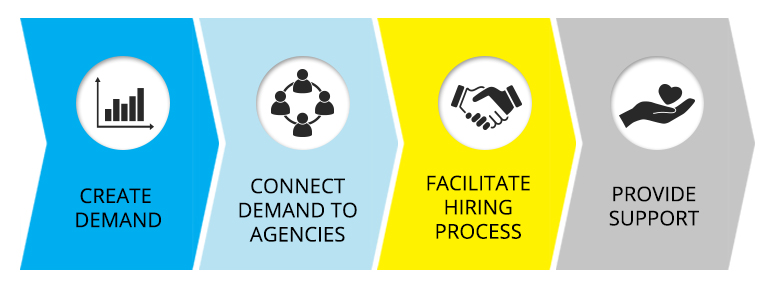One of the primary goals of Ready, Willing and Able (RWA) is to increase the employment rate of people with an intellectual disability and Autism Spectrum Disorder (ASD) by engaging employers and raising awareness about the value of hiring people with disabilities.
Ready, Willing and Able also recognizes that there are several conditions or key elements that need to be in place in order for an inclusive and effective labour market to develop and be sustained. These key elements, if available at the employer, individual and systems levels, together will result in the increased employment of people with intellectual disabilities and ASD. RWA is undertaking efforts in each of these key elements to ensure that employers gain appropriate access to this much under-utilized talent pool.

These key elements include:
Employer Capacity and Confidence
Many employers report a lack of confidence, understanding and awareness in their own ability to find, hire and manage employees with intellectual disabilities or ASD. Through RWA employers are given knowledge, resources and tools through targeted public awareness, peer-to-peer workshops, mentoring, training in inclusive HR strategies, guides on workplace accommodations and other tools. With increased knowledge comes increased employer capacity.
Employer-to-Employer Networks
Employers’ championing the hiring of people with intellectual disabilities or ASD, in a peer-to-peer model, is a proven method for engaging other employers and thus creating increased employment opportunities. RWA is establishing many new partnerships with employer-to-employer networks by engaging and informing local employer networks, service clubs and professional associations.
Entrepreneurship and Small Business Development
Entrepreneurship and small business development is a critical component of any labour market strategy. Entrepreneurship offers flexible solutions to people with intellectual disabilities or ASD for whom traditional employment is not a current fit or desire. RWA works to ensure that entrepreneurship is a viable option by providing expertise, knowledge, resources and support to existing community agencies.
Inclusive Post-secondary Education
Research indicates that post-secondary education and training significantly improves employment outcomes for people with intellectual disabilities or ASD just as for their non-disabled peers. RWA is supporting initiatives within post-secondary education and training institutions across the country to provide students with intellectual disabilities or ASD with the same opportunities as their peers for entry and meaningful participation at university, community college or technical institutions.
Service System Modernization
Currently in Canada, the most prevalent service response to the employment needs of people with intellectual disabilities is entry into a sheltered workshop and day program. For many people with ASD, existing services are unable to fully meet their needs. In both instances this results in exclusion from meaningful paid employment in the community. Working together with community partners, RWA is providing support, leadership and strategies to address the gaps in service delivery, policy and practice that currently contribute to the vast underemployment of people with intellectual disabilities or ASD.
Youth Transitions to Employment
Research shows that the single greatest predictor of youth having a paid job at or above minimum wage after leaving high school is having a paid job while attending high school. RWA works with employers, community services and educational institutions to build partnerships and community capacity to assist youth with intellectual disabilities or ASD to make the transition from high school to employment. RWA works to facilitate successful youth transitions to employment and careers by facilitating summer and part-time after-school employment opportunities for students; and assisting these students to pursue employment, career-development and postsecondary opportunities.